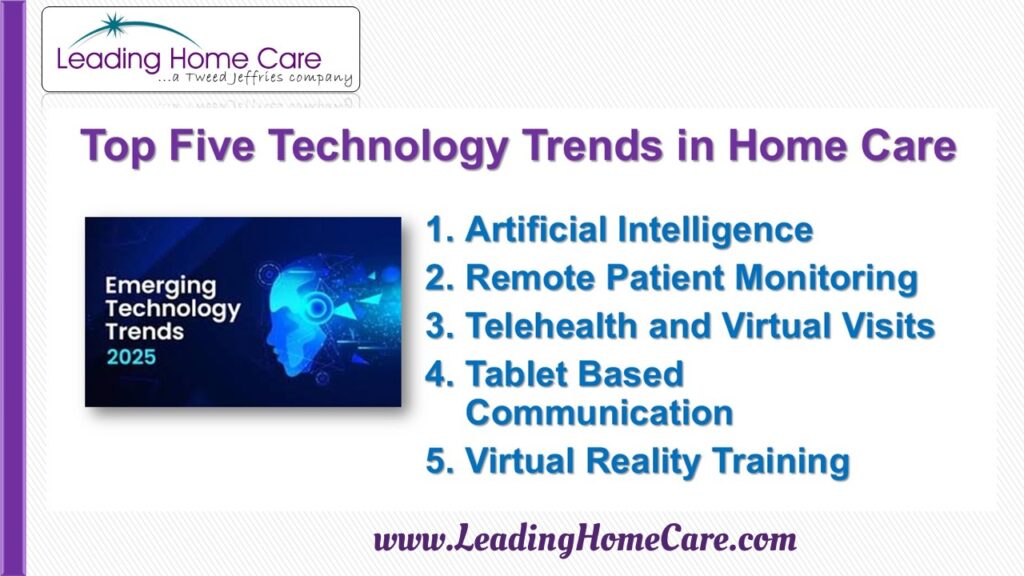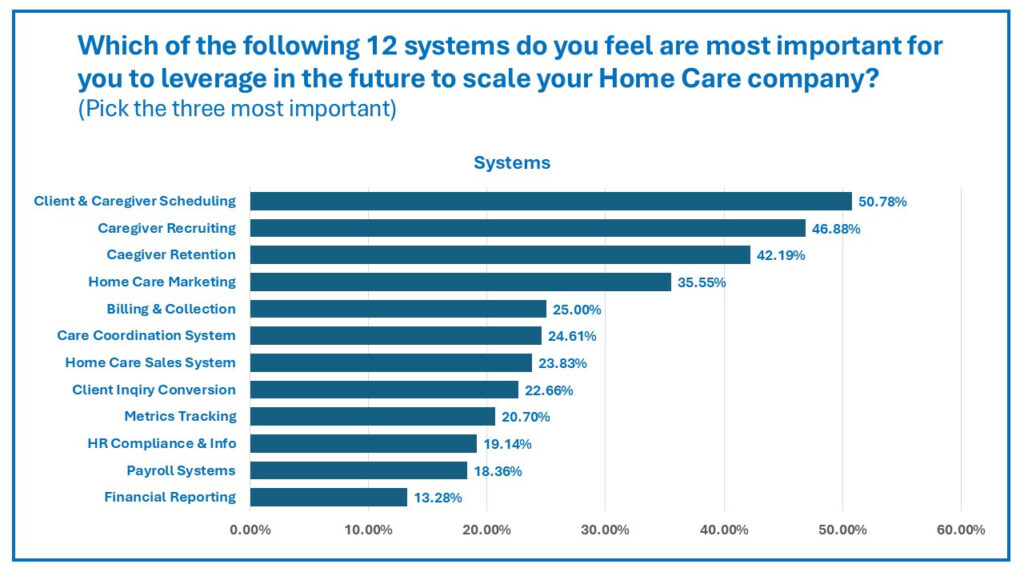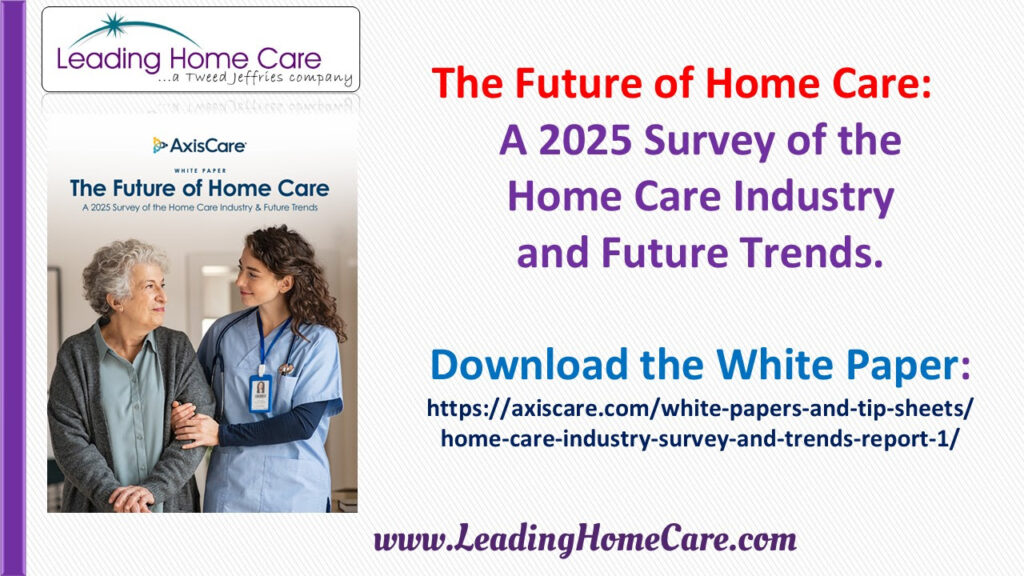I’ve been thinking a lot about Artificial Intelligence in Home Care.
The home care industry is undergoing a dramatic shift, propelled by demographic trends, workforce challenges, and consumer demand for more personalized, efficient, and affordable services. As agencies grapple with staffing shortages, rising costs, and increasing client expectations, technology—particularly artificial intelligence (AI)—has emerged as a powerful ally.
AI is no longer science fiction; it’s already making significant contributions across industries, and home care is no exception. From improving caregiver and client scheduling to enhancing safety in the home, AI offers transformative solutions to some of the sector’s biggest challenges. Let’s explore how AI is being applied in home care and the potential it holds to reshape the industry.
According to the 2025 Future of Home Care Study sponsored by AxisCare and conducted by Leading Home Care, the two most important applications of technology for the future are AI and Remote Patient Monitoring.

Why AI Matters in Home Care
At its core, AI involves using machines and software to replicate or augment human intelligence. It can analyze vast amounts of data, recognize patterns, and make predictions or decisions faster and more accurately than humans in certain contexts. In home care, where real-time decisions, efficient scheduling, and quality of care are critical, AI can be used to enhance operations, improve client outcomes, and support caregivers in delivering better care.
Here are five key applications of AI in the home care space:
1. Smart Scheduling and Caregiver Matching
AI-powered scheduling tools can automate the complex process of matching clients with caregivers based on multiple criteria—availability, proximity, skills, language, personality, and even past satisfaction scores. This not only saves time for administrators but also improves the caregiver-client fit, which leads to greater satisfaction and longer caregiver retention.
Benefits:
- Fewer scheduling errors and call-offs
- Higher client and caregiver satisfaction
- Reduced administrative burden
As you know, I have been doing a lot of work with AxisCare, the number one Home Care Operating System Software for user satisfaction. According to our 2025 Future of Home Care Study, the number one system that respondents are concerned about is “Caregiver and Client Scheduling.”
AxisCare is continually finding new ways to apply AI to make scheduling systems more effective.
2. Voice and Chat Assistants for Client Engagement
Virtual assistants, powered by natural language processing (NLP), can support older adults with medication reminders, appointment alerts, daily check-ins, and companionship. These systems can also collect health data during interactions, which can be analyzed to detect signs of cognitive decline or emotional distress.
Benefits:
- Enhanced client independence
- 24/7 support without needing a live caregiver
- Continuous monitoring without intrusion
A number of the members of our Home Care CEO Mastermind Groups are using chat features on their web sites to make it easier for potential clients and referral partners to connect with the agency.
3. Caregiver Training Through AI-Powered Simulations
AI is transforming caregiver education through immersive training platforms that use virtual reality (VR) or scenario-based simulations. These platforms can adapt in real-time to how the caregiver responds, offering personalized feedback and replicating real-world care challenges.
Benefits:
- More effective and engaging training
- Faster onboarding for new caregivers
- Improved care quality and confidence
Caregiver training is more critical than ever, and new AI Powered training platforms make learning more engaging, and encourage caregivers to more actively participate in the training. Our Best Caregiver Survey showed that the best caregivers in leading companies really appreciate the training they receive.
4. Remote Patient Monitoring and Smart Devices
AI-enabled wearable devices and sensors can track vitals, movement, sleep patterns, and more. These tools continuously monitor client conditions and can alert caregivers or family members when abnormalities are detected. For example, AI can analyze heart rate variability or gait changes to signal an impending fall or cardiac event.
Benefits:
- Real-time monitoring without intrusion
- Early detection of health concerns
- Peace of mind for families and care teams
Again, data from the 2025 Future of Home Care Study showed that the two top technologies that leaders see in the future are AI and Remote Patient Monitoring.
5. Automated Documentation and Support
Home care providers often face extensive documentation and compliance requirements. AI can streamline these processes by using voice-to-text systems to capture caregiver notes or automate documentation workflows. It can also flag inconsistencies or missing information that could trigger compliance issues.
Benefits:
- Reduced caregiver paperwork
- Better documentation accuracy
- Easier audits and regulatory compliance
How do these five opportunities affect you?
Which of these applications of AI are you now using or considering?

Looking Ahead: AI as a Partner, Not a Replacement
While AI offers tremendous potential, it is important to remember that it is a tool, not a substitute for human compassion and connection. In the context of home care, where empathy, trust, and relationships are essential, AI works best when it supports—not replaces—human caregivers.
By embracing AI thoughtfully, you can become more efficient, scalable, and responsive to client needs. As technology continues to evolve, the agencies that invest early in AI will not only improve their bottom lines but also enhance the lives of the people they serve.
Artificial intelligence is poised to revolutionize the home care industry. By automating administrative tasks, enhancing caregiver effectiveness, and providing real-time insights into client health, AI can help providers deliver smarter, safer, and more personalized care.
For home care leaders, now is the time to explore how AI can fit into your operations—starting small, learning fast, and scaling wisely. The future of home care will be powered by data and driven by empathy—and AI will be a crucial part of the journey.






